BusinessEurope Headlines No. 2019-13
BusinessEurope pushes for more Single Market
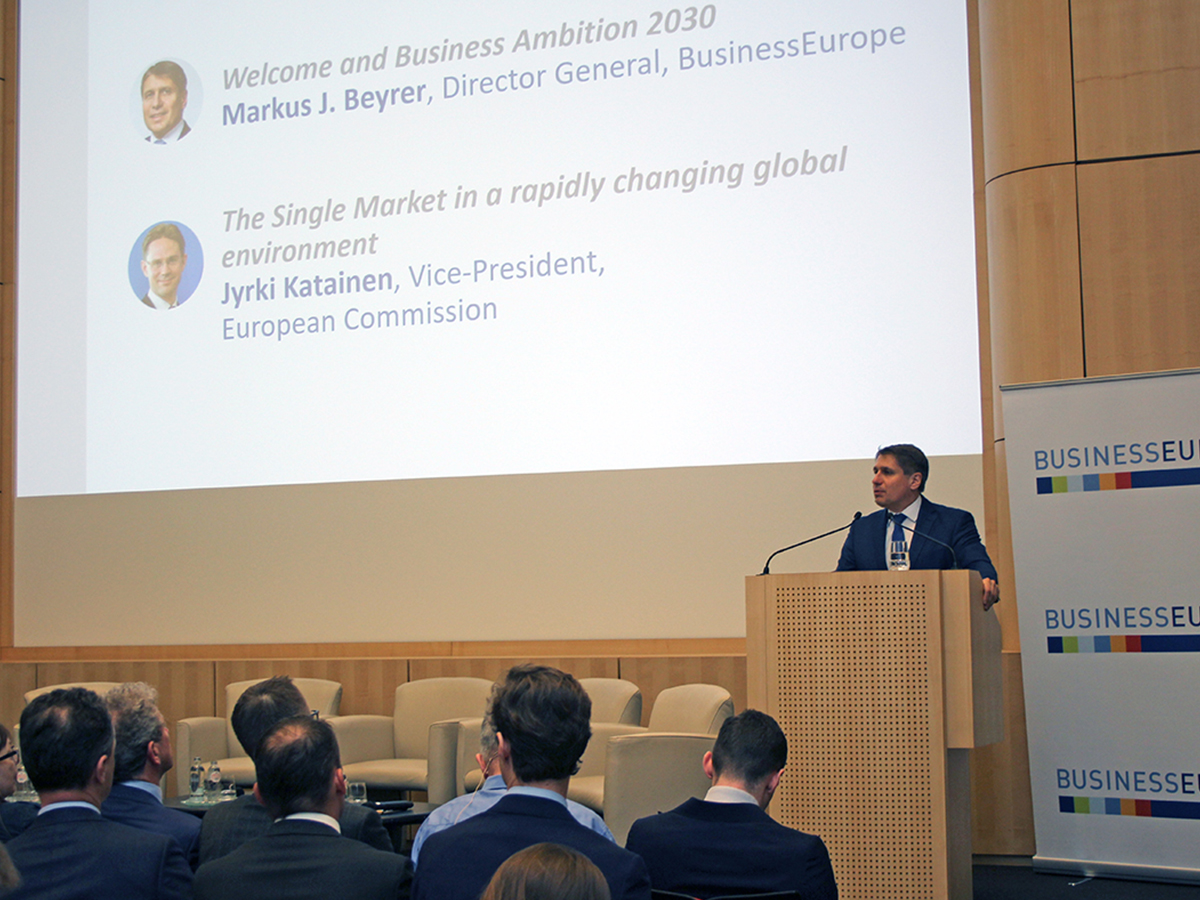
BusinessEurope on 10 April invited Member State officials, EU institutions and stakeholder partners such as business organisations, the European Trade Union Confederation (ETUC), the European Consumer Organisation (BEUC) and think tanks to have an open discussion on the future design of the Single Market rules and their implementation after the European election. Our Director General Markus J. Beyrer pointed out that Europe needs a strong and more integrated Single Market to be able to compete globally and to tackle current challenges like a changing environment for global trade, fast technological development and a fierce innovation competition, migration, climate change to name some. No EU Member State is capable of addressing it all alone. Freedoms of movement of capital, goods, services, people and data in the Single Market can give huge economic power which would enable faster economic and social convergence that is so needed in the EU. “Europe needs a fair level-playing field with the unquestioned freedoms of movement of people, capital, goods, services and data”, he said. Participants, including the European Commission Vice-President Jyrki Katainen, exchanged their thinking on the ambition for a barrier-free, fair and future-proof Single Market, and how to make rules so that market integration brings benefits to all. The event highlighted the necessity of “taking it seriously” to create an enforceable level playing field and ideas how to make implementation and enforcement more effective, transparent and uniform. This conference was a contribution to in depth discussion on the future agenda of the Single Market.
![]()
![]() Contact: Martynas Barysas
Contact: Martynas Barysas
Our comment
A turning point in EU-China relations?
By Maurice Fermont, Adviser for International Relations
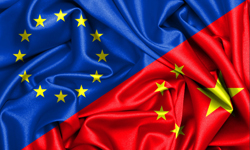
This week the 21st EU-China Summit took place in Brussels, an annual summit between political leaders of the European Union and China. The objective of this annual summit is to keep a finger on the pulse of the strategic partnership between the EU and China, and to agree on common objectives and sign off on achievements. In recent years, however, the summit has served more as a joint exercise of putting together a wish list than achieving real progress. Indeed, if no major outcomes are forthcoming soon, the summit and joint statement may well be reduced to an annual stock taking of how both sides view each other. And this too, is changing: China’s actions are significantly changing the way it is being viewed in Europe.
When China joined the World Trade Organisation (WTO) in 2001 it was widely believed that market opening would transform China into a fully-fledged market economy over time. Many foreign firms were first attracted to China through a host of preferential policies, producing and exporting mainly to foreign markets. Joint venture requirements initially featured as a blunt instrument to induce technology transfer to Chinese partners in exchange for market access. China’s investment-driven and export-led growth model turned it into the factory of the world. Although regulatory problems remained part of China’s economy, double digit economic growth and the belief that China would transform into a market economy meant that many companies expected these issues to eventually disappear. The rest is history.
Fast forward to the present, and it seems the future could not look more different. China is now the world’s second largest economy, and according to some of the pundits back in 2001, China should have become a market economy by 2016. Although the record shows mixed results, China broadly speaking held out on key reforms and resisted further market opening. Instead, China doubled down on its state-centric economic model since 2013 and has seemingly reintroduced political influence into all areas of its economy. Tellingly, it argued that WTO reform should respect members’ development models in a position paper it published in 2018 – implying that any degree of state intervention goes if it begets economic growth. In the same paper, China also argues against further disciplines for state-owned enterprises. Instead of reducing the role of the state in favour of the market, industrial policy features high on China’s agenda. Its declared objectives in its flagship programme ‘Made in China 2025’ includes comprehensive state-support to develop 10 key sectors that includes global market share targets that can climb up to 70% as well as provisions on “indigenous innovation” that aim to exclude foreign companies from supply chains.
No wonder then, that the way China is viewed in Europe is changing rapidly. The European business community has long supported China’s inclusion into the multilateral trading system and has made a substantial contribution to China’s economic success. Economic development is not a zero-sum exercise. But the way in which China has stacked the deck means that it has far greater access to Europe’s market than vice-versa, that its companies benefit from industrial subsidies where European companies do not, and that it can acquire companies and technology in Europe while European companies are barred from market entry or forced into joint ventures in China.
From 2016 European policy-makers argued for a greater need for reciprocity in the bilateral economic relationship. China had grown into a partner of formidable size, and equal treatment and access for business became paramount. What followed was a series of failures by China to live up to its promises. By 2018 it became clear that no real progress had been forthcoming, all while the problems of China’s market distortions increasingly began affecting global markets due to their sheer size and China’s increased global activity. By April 2019, following growing alarms among the business community over China’s direction, the European Commission published a Strategic Outlook in which it proposed specific steps to offset the negative spill-over effects of China’s state-centric economy on the European market.
The European business community still supports a positive, fair and reciprocal economic agenda with China. But a lack of delivery on key promises means that “promise fatigue” has set in and that measures are needed to restore a level playing field. A global economy can only function well when markets are well-regulated and do not feature distortions that undermine private activity and misallocate investments. Three important requirements to restore this level playing field are reciprocal market access, fair treatment and fair competition.
In this week’s summit the EU and China managed to agree on some important steps and timelines to achieve these goals: a commitment to discuss and address industrial subsidies in the context of WTO reform; an agreement to conclude bilateral negotiations on our comprehensive agreement on investment by 2020; and a conclusion of our agreement on geographical indications by 2019. Time will tell whether China intends to keep its promises and deliver on longstanding expectations. The EU has meanwhile demonstrated that it is willing to segment its relationship with China and will move forward with policies that address its concerns. Let’s now hope that China heeds these signals and treats its partners’ concerns seriously and delivers on its promises. This would be the surest way to revive trust and improve economic relations.
Contact: Maurice Fermont
Future of work: embracing the potential for business, workers and citizens
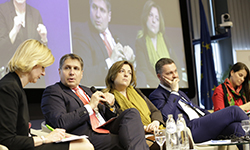 To make sure the future of work delivers benefits for all, we need the right frameworks for business to create the workplaces of the future and for workers and citizens to grasp the opportunities they provide. This was the key message of Markus J. Beyrer, BusinessEurope Director General at the EU conference on 9 April on future of work. He called for a step-change in EU social policy, which encourages labour markets to better meet companies’ and workers’ changing needs for flexibility and security. And bearing in mind that the economic recovery is slowing in Europe, social policy needs to be combined with a strategy for increasing growth and competitiveness across all EU Member States.
To make sure the future of work delivers benefits for all, we need the right frameworks for business to create the workplaces of the future and for workers and citizens to grasp the opportunities they provide. This was the key message of Markus J. Beyrer, BusinessEurope Director General at the EU conference on 9 April on future of work. He called for a step-change in EU social policy, which encourages labour markets to better meet companies’ and workers’ changing needs for flexibility and security. And bearing in mind that the economic recovery is slowing in Europe, social policy needs to be combined with a strategy for increasing growth and competitiveness across all EU Member States.
Contact: Rebekah Smith
Photo copyright: European Commission
Europeans, go and vote
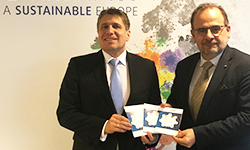 BusinessEurope Director General Markus J. Beyrer met with the president of the European Economic and Social Committee (EESC), Luca Jahier on 9 April in Brussels. Both analysed the current political and economic situation in Europe and agreed that the elections on 23-26 May will be a crucial moment for Europe. In view of recent studies showing that Europeans strongly trust their own employer, the role of business is to explain the critical importance of the European Union and to motivate people to go and use their right to vote. Both agreed that Europe must do better in embracing the technologies of tomorrow and help companies to grow and gain critical size to compete on the global markets.
BusinessEurope Director General Markus J. Beyrer met with the president of the European Economic and Social Committee (EESC), Luca Jahier on 9 April in Brussels. Both analysed the current political and economic situation in Europe and agreed that the elections on 23-26 May will be a crucial moment for Europe. In view of recent studies showing that Europeans strongly trust their own employer, the role of business is to explain the critical importance of the European Union and to motivate people to go and use their right to vote. Both agreed that Europe must do better in embracing the technologies of tomorrow and help companies to grow and gain critical size to compete on the global markets.
Contact: Christian Feustel
Social Partners discuss future priorities at Ecofin informal meeting
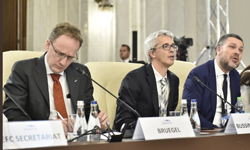 “The EU must take steps to improve its attractiveness as a location for business investment”. This was the key message of BusinessEurope’s Director of Economics, James Watson, at an informal meeting of the EU’s Economic and Financial Affairs Council (ECOFIN) in Bucharest on 5 April. Commenting on a paper prepared by the think-tank Bruegel on promoting sustainable and inclusive growth and convergence in the EU, James noted that the EU has fallen behind in its ability to start and develop global companies, with none of the largest 10 global companies currently in the EU, and the EU home to a declining proportion of the world’s most profitable firms. A new emphasis on industrial policy, including greater focus in the EU budget on R&D expenditure, combined with further efforts to complete the single market, particularly for digital services, and a greater urgency to complete EMU, including a full banking union, were all emphasised as initiatives that could support investment, growth and employment.
“The EU must take steps to improve its attractiveness as a location for business investment”. This was the key message of BusinessEurope’s Director of Economics, James Watson, at an informal meeting of the EU’s Economic and Financial Affairs Council (ECOFIN) in Bucharest on 5 April. Commenting on a paper prepared by the think-tank Bruegel on promoting sustainable and inclusive growth and convergence in the EU, James noted that the EU has fallen behind in its ability to start and develop global companies, with none of the largest 10 global companies currently in the EU, and the EU home to a declining proportion of the world’s most profitable firms. A new emphasis on industrial policy, including greater focus in the EU budget on R&D expenditure, combined with further efforts to complete the single market, particularly for digital services, and a greater urgency to complete EMU, including a full banking union, were all emphasised as initiatives that could support investment, growth and employment.
![]() Contact: James Watson
Contact: James Watson
A renewed role for the European Semester
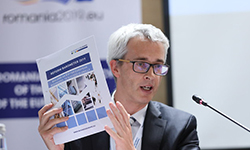 “The European Semester must be developed to improve the implementation of country specific reform recommendations (CSRs)”. This was the main message of BusinessEurope’s Economics Director James Watson at an event organised by the Romanian EU Council Presidency in Bucharest on 4th April entitled “The coordination of economic policies at EU level, a renewed role for the European Semester”. Speaking alongside senior members of the Romanian Government and European Commission representatives, James referred to the finding of our recent Reform Barometer, that whilst our members believe that 90% of the CSRs are either important or very important, only 20% are currently being implemented satisfactorily by Member States. Proposals such as the one made by the Commission for the next long-term EU budgetary (MFF) to include a “Reform Delivery Tool”, whereby member states would receive a financial contribution upon the delivery of agreed reforms are essential to help increase implementation, and in-turn, long-term growth and employment.
“The European Semester must be developed to improve the implementation of country specific reform recommendations (CSRs)”. This was the main message of BusinessEurope’s Economics Director James Watson at an event organised by the Romanian EU Council Presidency in Bucharest on 4th April entitled “The coordination of economic policies at EU level, a renewed role for the European Semester”. Speaking alongside senior members of the Romanian Government and European Commission representatives, James referred to the finding of our recent Reform Barometer, that whilst our members believe that 90% of the CSRs are either important or very important, only 20% are currently being implemented satisfactorily by Member States. Proposals such as the one made by the Commission for the next long-term EU budgetary (MFF) to include a “Reform Delivery Tool”, whereby member states would receive a financial contribution upon the delivery of agreed reforms are essential to help increase implementation, and in-turn, long-term growth and employment.
![]() Contact: James Watson
Contact: James Watson
Photo copyright: Ministry of Foreign Affairs / Andreea Tănase
Boosting women’s employment: the key action to improve gender equality
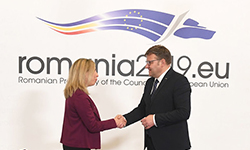 Increasing women’s participation in the labour market should be our top priority to improve equality between men and women in the EU. This was the key message of Stefania Rossi, Vice-Chair of BusinessEurope Social Affairs Committee at the Informal Employment and Social Affairs Council (EPSCO) on 10 April. Fostering economic independence of women and empowering them is not only positive for their personal fulfilment, but also in maximising the potential of the workforce for sustainable growth in Europe. To support this, Member States need to do better in providing access to affordable childcare and other care infrastructures. To tackle the gender pay gap, we need a cultural shift in attitudes to combat gender stereotypes and segregation rather than changes to or new legislation.
Increasing women’s participation in the labour market should be our top priority to improve equality between men and women in the EU. This was the key message of Stefania Rossi, Vice-Chair of BusinessEurope Social Affairs Committee at the Informal Employment and Social Affairs Council (EPSCO) on 10 April. Fostering economic independence of women and empowering them is not only positive for their personal fulfilment, but also in maximising the potential of the workforce for sustainable growth in Europe. To support this, Member States need to do better in providing access to affordable childcare and other care infrastructures. To tackle the gender pay gap, we need a cultural shift in attitudes to combat gender stereotypes and segregation rather than changes to or new legislation.
Contact: Rebekah Smith
Photo copyright: AGERPRES FOTO / Cristian Nistor
The voice of business should be heard more loudly in the WTO
 On 4 April, the first event of the “Global Trade Series 2019”, organised, among others, by Georgetown Law, took place in Washington D.C. Sofia Bournou, Senior Adviser for International Relations at BusinessEurope participated in a panel discussion which dealt with the implications of the current crisis in the World Trade Organisation (WTO) for business. “Safeguarding a strong and effective WTO is a competitiveness issue for businesses all over the world. It is the shared understanding that common rules bring not only stability and predictability in the global trading system, but they also bring a level-playing field, not allowing the most powerful to impose its interests on the rest”, Bournou said. The panel, comprised by representatives of companies and business associations, explored ways in which business can play a more prominent role in the current discussions on the reform of the WTO, for instance by presenting success stories and explaining how they use the rules and the jurisdiction of the WTO’s Dispute Settlement and the Appellate Bodies in their everyday business operations. The idea that a more permanent structure should be created within the WTO to ensure the more direct engagement of businesses was also flagged.
On 4 April, the first event of the “Global Trade Series 2019”, organised, among others, by Georgetown Law, took place in Washington D.C. Sofia Bournou, Senior Adviser for International Relations at BusinessEurope participated in a panel discussion which dealt with the implications of the current crisis in the World Trade Organisation (WTO) for business. “Safeguarding a strong and effective WTO is a competitiveness issue for businesses all over the world. It is the shared understanding that common rules bring not only stability and predictability in the global trading system, but they also bring a level-playing field, not allowing the most powerful to impose its interests on the rest”, Bournou said. The panel, comprised by representatives of companies and business associations, explored ways in which business can play a more prominent role in the current discussions on the reform of the WTO, for instance by presenting success stories and explaining how they use the rules and the jurisdiction of the WTO’s Dispute Settlement and the Appellate Bodies in their everyday business operations. The idea that a more permanent structure should be created within the WTO to ensure the more direct engagement of businesses was also flagged.
Contact: Sofia Bournou
Intellectual Property Office: cooperation with users remains essential
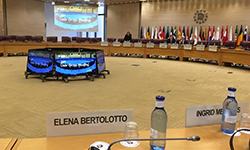 Close cooperation between the European Union Intellectual Property Office (EUIPO) and representatives of its main user groups, such as BusinessEurope, the European Brands Association (AIM), the International Trademark Association (INTA), the European Communities Trade Mark Association (ECTA) and MARQUES remains essential. At an annual meeting with the EUIPO on 4-5 April in Alicante, Spain, BusinessEurope Adviser Elena Bertolotto and the Chairman of the Trade Marks and Designs Working Group Martina Eberle highlighted that broad user input is crucial for the EUIPO decision-making bodies to fully understand the likely consequences of any envisaged changes in the EU IP system. It is very important that the EUIPO maintains its approach to involve users in all kinds of projects and ongoing activities, such as working programmes, Convergence Programmes and international cooperation projects. During the meeting, a wide range of such topics and projects carried out by the European Union Intellectual Property Office (EUIPO) was discussed.
Close cooperation between the European Union Intellectual Property Office (EUIPO) and representatives of its main user groups, such as BusinessEurope, the European Brands Association (AIM), the International Trademark Association (INTA), the European Communities Trade Mark Association (ECTA) and MARQUES remains essential. At an annual meeting with the EUIPO on 4-5 April in Alicante, Spain, BusinessEurope Adviser Elena Bertolotto and the Chairman of the Trade Marks and Designs Working Group Martina Eberle highlighted that broad user input is crucial for the EUIPO decision-making bodies to fully understand the likely consequences of any envisaged changes in the EU IP system. It is very important that the EUIPO maintains its approach to involve users in all kinds of projects and ongoing activities, such as working programmes, Convergence Programmes and international cooperation projects. During the meeting, a wide range of such topics and projects carried out by the European Union Intellectual Property Office (EUIPO) was discussed.
Contact: Elena Bertolotto
Calendar
- 16 April: International conference "2030 Agenda: Partnerships for Sustainable Development"
- 4 May: Open Day of the European institutions in Brussels
- 6-7 May: EBS 2019: Tomorrow's Europe
Reminder: please take a look at our revised privacy policy